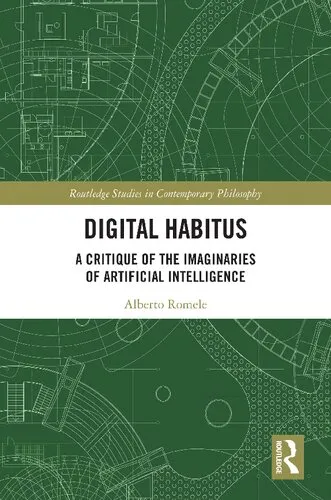Digital Habitus: A Critique of the Imaginaries of Artificial Intelligence (Routledge Studies in Contemporary Philosophy)
4.5
Reviews from our users

You Can Ask your questions from this book's AI after Login
Each download or ask from book AI costs 2 points. To earn more free points, please visit the Points Guide Page and complete some valuable actions.Related Refrences:
Introduction to "Digital Habitus: A Critique of the Imaginaries of Artificial Intelligence"
Authored by Alberto Romele, "Digital Habitus" offers a prismatic view into the intricate relationships between artificial intelligence (AI) and contemporary digital culture, filtered through the lens of philosophical discourse. This book underscores the critical role of human imagination in both shaping and understanding AI, diverging from the conventional, utilitarian narratives often associated with AI technologies. By examining AI's societal implications through a rich philosophical context, "Digital Habitus" invites readers to engage with deeper questions around meaning, identity, and technological influence.
Detailed Summary of the Book
In "Digital Habitus," Romele embarks on an intellectual journey that melds philosophy, cultural theory, and technology studies. The book spans several key themes, beginning with an exploration of the philosophical underpinnings of AI. It highlights how narratives and imaginaries around AI are not purely technical or scientific endeavors but are deeply embedded within cultural and ideological constructs.
Drawing on thinkers like Pierre Bourdieu, the concept of "habitus" is central to the discussion, representing the ways in which societal structures and cultural norms shape individual perceptions and actions. Romele extends this concept into the digital realm, coining the term "digital habitus" to describe the new modes of human experience and interaction fostered by digital technologies and AI.
Throughout the book, Romele argues that the imaginaries surrounding AI reflect broader existential concerns and ethical questions. How do these technologies influence our conception of self? What are the implications for autonomy, agency, and authenticity in a digitally mediated world? By critically engaging with these questions, Romele seeks to unravel the complex web of narratives that sustain the allure and apprehension surrounding AI.
Key Takeaways
- AI cannot be fully understood without acknowledging the cultural and ideological narratives that surround it.
- The concept of "digital habitus" offers a novel framework for exploring how AI reshapes human behavior and identity.
- Philosophical reflection is crucial in navigating the ethical and existential questions posed by advanced technologies.
- Romele advocates for a more nuanced discourse on AI that goes beyond technological determinism and considers the richness of human experience.
Famous Quotes from the Book
"Artificial intelligence, in its many forms, acts as both a mirror and lens, reflecting and refracting the depths of human aspiration and anxiety."
"To comprehend AI, we must first unravel the cultural narratives that have engendered its development and ceded it its power."
"In an era where digital technologies permeate every facet of life, the question is not whether we are shaped by these tools, but how and to what extent."
Why This Book Matters
The importance of "Digital Habitus" lies in its interdisciplinary approach, bridging philosophy and technology, and offering an alternative perspective in AI discourse. At a time when AI impacts nearly every sector, from healthcare to governance, Romele's philosophical critique serves as a crucial counterbalance to purely technical debates.
This book matters because it challenges readers to think critically about the cultural and social fabric into which AI is woven. Romele's work highlights the necessity of engaging with AI not just as a set of tools or systems, but as deeply significant phenomena that hold the potential to redefine human existence. By focusing on the imaginaries of AI, Romele encourages a dialog that is both reflective and forward-thinking, urging society to contemplate what it means to be human in an increasingly artificial world.
Free Direct Download
You Can Download this book after Login
Accessing books through legal platforms and public libraries not only supports the rights of authors and publishers but also contributes to the sustainability of reading culture. Before downloading, please take a moment to consider these options.
Find this book on other platforms:
WorldCat helps you find books in libraries worldwide.
See ratings, reviews, and discussions on Goodreads.
Find and buy rare or used books on AbeBooks.
1309
بازدید4.5
امتیاز50
نظر98%
رضایتReviews:
4.5
Based on 0 users review
"کیفیت چاپ عالی بود، خیلی راضیام"



